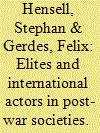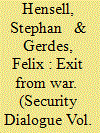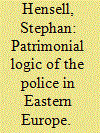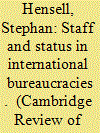| Srl | Item |
| 1 |
ID:
113103


|
|
|
|
|
| Publication |
2012.
|
| Summary/Abstract |
This article analyses the efforts of external actors to influence opportunities for national political elites to gain or maintain positions of power in post-conflict societies. The analysis compares the cases of Liberia and Kosovo, both of which have been characterized by high levels of external intervention though with significant differences in the scope of authority of external actors. Despite these differences, similar dynamics have characterized elite formation in both countries. The impact of external actors on elite systems is mostly indirect, and chances for accumulating authority provided by the national setting determine elite careers. External actors bow to these national conditions rather than decisively changing them.
|
|
|
|
|
|
|
|
|
|
|
|
|
|
|
|
| 2 |
ID:
152408


|
|
|
|
|
| Summary/Abstract |
The reintegration of rebels after war is a key security challenge. This article analyses the post-war transformation of rebels as a process of joining the established political elite. The political careers of former rebels vary. While some rise to senior political positions, others fail to consolidate their power. Taking theoretical notions of Pierre Bourdieu as its point of departure, this article outlines the central role of social capital in the post-war political field, which allows for an analysis and explanation of differences in rebel inclusion and exclusion. The article argues that the political careers of rebels are dependent on the accumulation of vertical and horizontal social capital in elite–mass and intra-elite networks. Case studies of Liberia and Kosovo demonstrate the plausibility of our thesis and the fruitfulness of a Bourdieusian approach in studying the political transformation of armed groups. This article contributes to the debate on the post-war reintegration of rebels as well as to the debate on practice approaches in international relations and security studies.
|
|
|
|
|
|
|
|
|
|
|
|
|
|
|
|
| 3 |
ID:
114172


|
|
|
|
|
| Publication |
2012.
|
| Summary/Abstract |
The police in Eastern Europe are often regarded as politicised, poorly trained and corrupt. This article argues that the police follow a patrimonial logic. Neo-patrimonialism is mostly understood as an authoritarian regime with a personal ruler at the top. By contrast, here a concept will be suggested which reformulates patrimonialism as the practice of the acquisition of offices and material resources. Based on this, two case studies analyse the police administration in Albania and Georgia. The findings suggest that patrimonial practices play a central role in the recruiting and financing of law enforcement officers. The result is a hybrid administration, which is significantly subject to special interests.
|
|
|
|
|
|
|
|
|
|
|
|
|
|
|
|
| 4 |
ID:
153899


|
|
|
|
|
| Summary/Abstract |
Recent studies in international relations (IR) have devoted little systematic attention to the personnel of international organizations. This article argues that the works of Max Weber could provide an orientation for future research on the cohesion and autonomy of the staff in international bureaucracies. In his writings, Weber highlights the role of bureaucratic officials as an “occupational status group” or Berufsstand distinguished by their professional ethics, privileged positions, practices of social closure and a particular style of life, which is expressed in a claim to social prestige. Weber suggests a sociological analysis of bureaucratic staff, whose group character is determined by their occupation and profession. The article outlines Weber’s understanding of the administrative official by revisiting his seminal sociological and political writings. The added value of Weber’s conception for IR is demonstrated with an empirical sketch of the EU civil service, which can be analysed as a transnational status group in the making.
|
|
|
|
|
|
|
|
|
|
|
|
|
|
|
|